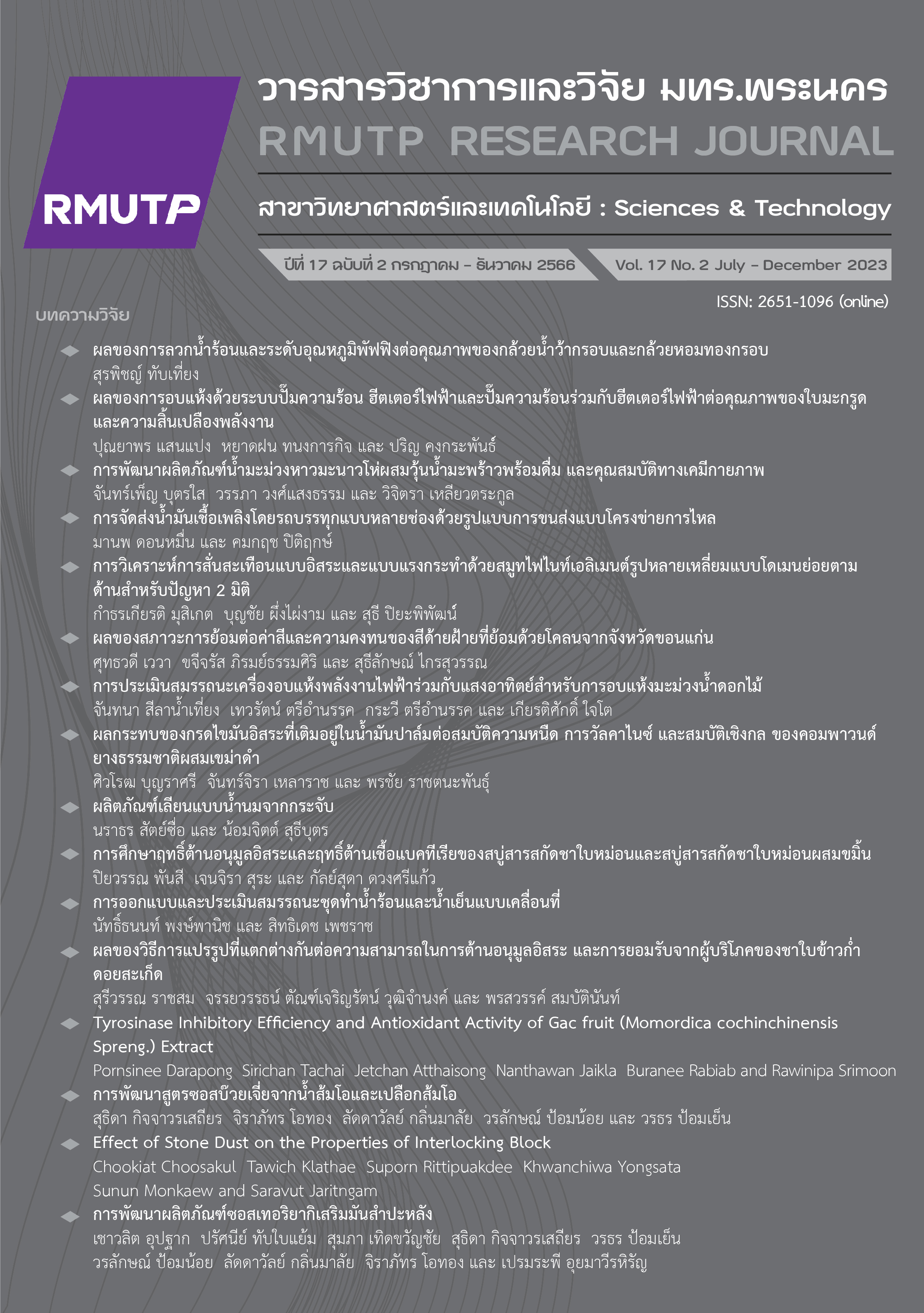Multi-compartment Fuel Delivery with Network Flow Model of Transportation
Main Article Content
Abstract
Thailand's fuel transportation business relies mainly on the road because it is a convenient form of transportation. It can deliver all places better than other modes of transport and can meet the needs of customers thoroughly. However, if there are methods that help in planning the fuel delivery management, fast accurate cost calculation and effective as a result, such organizations can reduce the costs incurred from planning the delivery, reduce errors in costing for delivery planning, and the operation time of employees. The research examines the solutions to three types of fuel delivery problems with multi-compartment of trucks. The objective is to propose a network flow model of transportation model for delivering fuel by multi-compartment of trucks, providing the lowest delivery costs. A 30-day sample of the company's data (30 samples) was taken and processed to find an answer to compare it with the current method and the proposed model. The results showed that the proposed model can help to calculate the average cost of 3.411 million baht per day. The average processing time for the solution of 433.20 seconds. While the current method costs an average of 3.493 million baht per day and an average processing time of 4,907.29 seconds. The proposed model provided better results than the current method regarding delivery costs and short processing times.
Article Details

This work is licensed under a Creative Commons Attribution-NonCommercial-NoDerivatives 4.0 International License.
ลิขสิทธ์ ของมหาวิทยาลัยเทคโนโลยีราชมงคลพระนครReferences
S. Martins, M. Ostermeier, P. Amorim, A. Hübner, and B. Almada-Lobo, “Product-oriented time window assignment for a multi-compartment vehicle routing problem,” Eur. J. Oper. Res., vol. 276, no. 3, pp. 893–909, 2019.
E. Fernández, H. Andersson, K. Fagerholt, and G. Laporte, “Computers & Operations Research Vessel routing with pickups and deliveries : An application to the supply of o ff shore oil platforms,” vol. 79, no. March 2016, pp. 140–147, 2017.
S. W. Hwang, S. J. Kweon, and J. A. Ventura, “Locating Alternative-Fuel Refueling Stations on a Multi-Class Vehicle Transportation Network,” Eur. J. Oper. Res., vol. 0, pp. 1–17, 2017.
Z. Li and C. Jiang, “Study on the Transportation Problem of Petrol Secondary Distribution with Considering Shortage Cost,” Open J. Model. Simulation, 2016, no. 4, pp. 34–40, 2016.
S. Fazayeli, A. Eydi, and I. N. Kamalabadi, “Location-routing problem in multimodal transportation network with time windows and fuzzy demands: Presenting a two-part genetic algorithm,” Comput. Ind. Eng., vol. 119, no. March, pp. 233–246, 2018.
L. Wang, J. Kinable, and T. van Woensel, “The fuel replenishment problem: A split-delivery multi-compartment vehicle routing problem with multiple trips,” Comput. Oper. Res., vol. 118, 2020
M. Ji, L. Shen, B. Shi, Y. Xue, and F. Wang, “Routing optimization for multi-type containerships in a hub-and-spoke network,” J. Traffic Transp. Eng. (English Ed., vol. 2, no. 5, pp. 362–372, 2015.
N. Kasamtaranan and H. Tiewtong, “Routing for gasoline transportation : A Case Study of Gasoline Transport Service Company,” Interdiscip. Sripatum Chonburi J., vol. 6, no. August, pp. 91–98, 2020.
Nitidetch Koohatongsumrit, “Optimal route selecting by multi-criteria decision making analysis,” RMUTP Res. J., vol. 11, no. 1, pp. 137–150, 2017.
C. Kavirathna, T. Kawasaki, S. Hanaoka, and T. Matsuda, “Transshipment hub port selection criteria by shipping lines: the case of hub ports around the bay of Bengal,” J. Shipp. Trade, vol. 3, no. 1, pp. 1–25, 2018.
M. Donmuen and K. Pitiruek, “Network Model Approach for Fuel Transportation Business,” IEEE Int. Conf. Ind. Eng. Eng. Manag., pp. 1370–1373, 2019.
M. Furkan Uzar and B. Çatay, “Distribution planning of bulk lubricants at BP Turkey,” Omega, vol. 40, no. 6, pp. 870–881, 2012.
S. S. Mohri, S. Mortazavi, and N. Nassir, “A clustering method for measuring accessibility and equity in public transportation service: Case study of Melbourne,” Sustain. Cities Soc., vol. 74, no. July, p. 103241, 2021.
M. A. Islam, Y. Gajpal, and T. Y. ElMekkawy, “Mixed fleet based green clustered logistics problem under carbon emission cap,” Sustain. Cities Soc., vol. 72, no. January, p. 103074, 2021.
K. Heßler, “Exact algorithms for the multi-compartment vehicle routing problem with flexible compartment sizes,” Eur. J. Oper. Res., vol. 294, no. 1, pp. 188–205, 2021.


